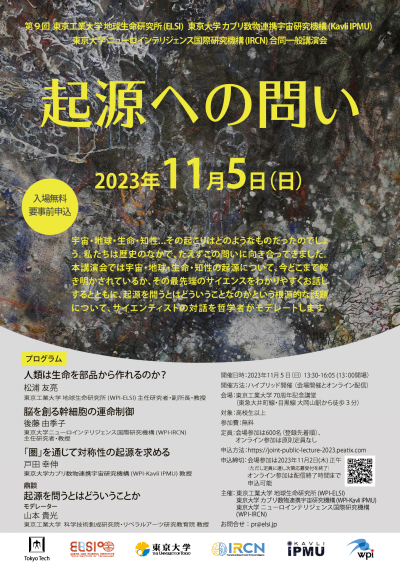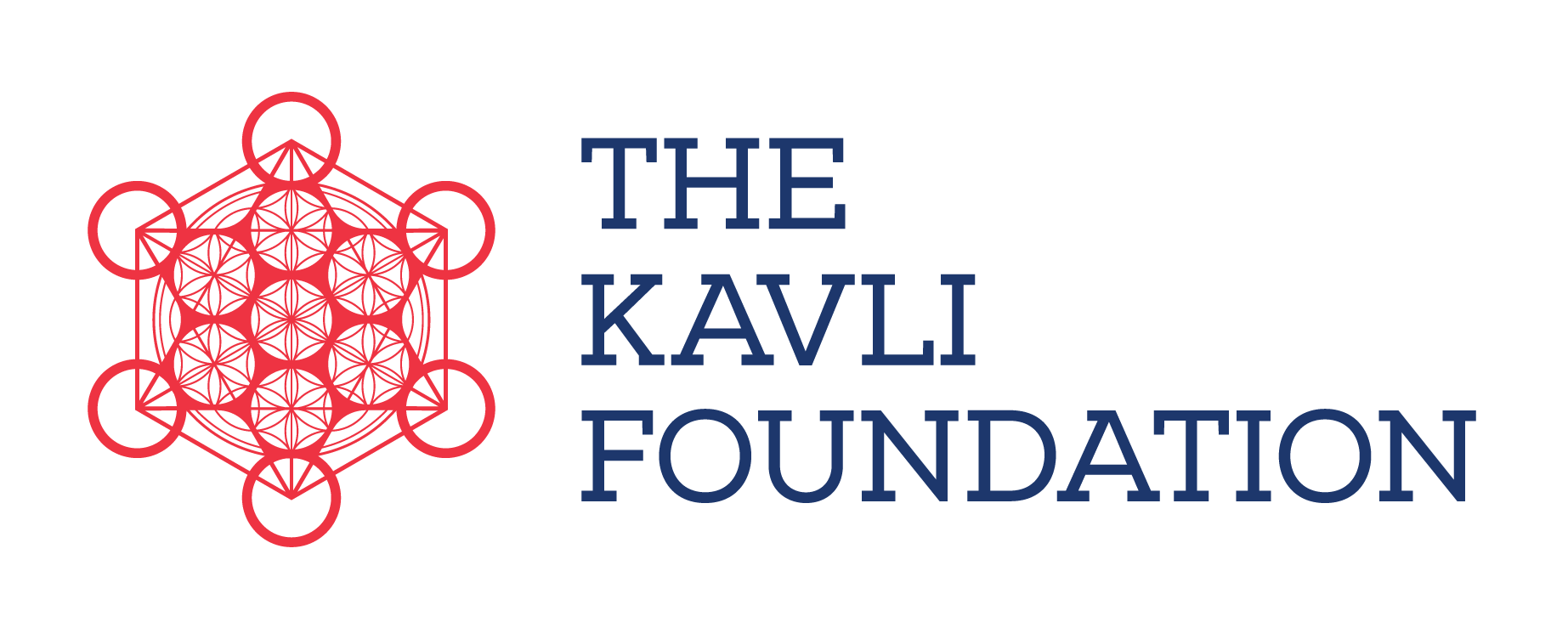October 10, 2022
Kavli Institute for the Physics and Mathematics of the Universe (Kavli IPMU)

On November 5 (Sun), we invite you to take part in our upcoming hybrid event, the 8th Public Lecture series "A Question of Origins", jointly hosted by the Kavli Institute for the Physics and Mathematics of the Universe (Kavli IPMU), the Tokyo Institute of Technology's Earth-Life Science Institute (ELSI). Continuing on from last year, this year the event will be co-hosted by The University of Tokyo's International Research Center for Neurointelligence (IRCN).
The Universe, Earth, Human Intelligence. How did it all begin? Throughout history, humans have always asked this question. In this event, researchers will talk about how far science has come to uncover the origin of the Universe, of Earth, and Human Intelligence. They will also discuss what it means to study the origin of something, moderated by a researcher who has crossed roads with mathematics, information sciences, physics and philosophy to discuss and think about what it means to look for an origin.
Program
1:45PM - 2:15PM
Lecture 1
Can humankind make life from pieces?
Speaker: Tomoaki Matsuura (ELSI Professor)
Life is everywhere. Life exists in the diverse number of environments on earth that it is more difficult to find a place where life does not exist. Life exists in the harshest environments, including hot, cold, and dark. It also has an astonishing variety of forms and ecologies. However, the basic unit of life on earth is the cell. The formation of cells were the first step in the emergence of life. So how did cells come into being? Researchers around the world are working to answer this, and are trying to artificially create cells from their components in the laboratory. This talk will introduce the frontiers of research into creating cells from their components.
2:15PM - 2:45PM
Lecture 2
Controlling stem cells that create the brain
Speaker: Yukiko Gotoh (IRCN Professor)
Our brains are made up of a very diverse range of neuron and glial cells. These cells are produced from a common progenitor cell called the neural stem cell, but they are never produced randomly. A functioning brain will make sure the required number of the required cell types are produced a placed in the correct locations. So then, how do neural stem cells determine the types of cells to produce? How does the brain change when its development is affected by stress? In this lecture, I will discuss these questions and projects being carried out.
2:45PM - 3:15PM
Lecture 3
Using a "sphere" to explore the origin of symmetry
Speaker: Yukinobu Toda (Kavli IPMU Professor)
In our universe, it is believed that there is (or might be) an invisible 6-dimensional space called a Calabi-Yau manifold. Counting the number of surfaces and size of a given shape in this 6-dimensional space is an important and interesting problem in both mathematics and physics. On the other hand, a "sphere" is an abstract concept that represents a community of mathematical objects. Various symmetries in mathematics can be realized using spheres. In this talk, I will talk about the mysterious regularity and symmetry of counting surfaces, as well as deeper structures, by taking away the concept of a "number" and using the concept of a "sphere" to seek their origin.
3:25PM - 4:05PM
Discussion
What does it mean to study an origin
Moderator: Takamitsu Yamamoto (Professor, Institute of Innovative Research / Institute for Liberal Arts, Tokyo Institute of Technology)
What does it mean to question an origin? In this discussion we will ask three researchers who approach origins in different fields.
Summary
| Time & Date: |
1:30 PM - 4:05PM, November 5 (Sun), 2023 |
| Venue: | Hybrid event Onsite venue: 70th Anniversary Auditorium, Tokyo Institute of Technology (3 min walk from Ookayama station, Tokyu Oimachi line, Meguro line) |
| Host: | The University of Tokyo Kavli Institute for the Physics and Mathematics of the Universe (Kavli IPMU), Tokyo Institute of Technology Earth-Life Science Institute (ELSI), and The University of Tokyo International Research Center for Neurointelligence (IRCN) |
| Difficulty: | High school level and above |
| Admission: | Free |
| Seats: |
600 seats (registration required, first come first serve), no seat limit for online viewing |
| Registration: |
ELSI event website |
| Registration deadline: | 12 Noon November 2, 2023 Online participation will be available until the event finishes |
| Enquiries: |
pr@elsi.jp |
About the Kavli IPMU x (Kakeru) Collection
A series of events where Kavli IPMU researchers have exchanged discussions with experts from different disciplines. Click here for a full list of past events.。






